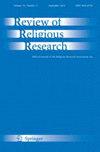The Demographic Makeup of Congregations and Clergy Mental Health: A Research Note
IF 1.5
1区 哲学
0 RELIGION
引用次数: 0
Abstract
The mental health of religious leaders is a serious concern as the emotional, psychological, and spiritual demands on clergy are incredibly high. These demands, however, are likely to vary by the demographic makeup of the congregation that leaders serve, which leads us to expect that clergy mental health is associated with congregational demographics. In this study, we use recently collected (2020), nationally representative survey data from the primary leaders of religious congregations ( N = 636) to examine the associations between congregational demographics—the social class, gender, racial, age, and political makeup of religious congregations—and leaders’ mental health. The most robust finding from the full model is that political incongruence between leaders and attendees is strongly associated with worse mental health for clergy. We conclude with a discussion of what the results mean for the mental health of religious leaders in a time of declining religion, growing political polarization, and high rates of anxiety.会众的人口构成与神职人员的心理健康:研究说明
宗教领袖的心理健康是一个令人严重关切的问题,因为对神职人员的情感、心理和精神要求之高令人难以置信。然而,这些要求很可能会因宗教领袖所服务的会众的人口构成而有所不同,因此我们认为神职人员的心理健康与会众的人口构成有关。在本研究中,我们利用最近收集的(2020 年)、具有全国代表性的宗教会众主要领导人(N = 636)的调查数据,研究了会众人口统计学特征--宗教会众的社会阶层、性别、种族、年龄和政治构成--与领导人心理健康之间的关联。从完整模型中得出的最有力的结论是,领导者与信徒之间的政治不一致与神职人员的心理健康状况恶化密切相关。最后,我们讨论了在宗教衰落、政治两极分化日益严重、焦虑率居高不下的时代,这些结果对宗教领袖的心理健康意味着什么。
本文章由计算机程序翻译,如有差异,请以英文原文为准。
求助全文
约1分钟内获得全文
求助全文
来源期刊

Review of Religious Research
Multiple-
CiteScore
2.50
自引率
20.00%
发文量
31
期刊介绍:
The Review of Religious Research (RRR) publishes empirical social science research on religion, primarily in sociology and social psychology and related fields of psychology, and scholarly literature reviews of research in these fields. RRR provides a forum for research across multiple disciplines and approaches, including research on the following topical areas: Clergy; Church programs; Comparative analyses of religious denominations and institutions; Denominational and congregational growth, decline, and vitality; Denominational and congregational conflict, competition, and cooperation; Ethnicity/race and religion; Generational and personal religious change; New religious movements; Personal spiritual and religious beliefs and practices; Religion and attitudes; Religion and family; Religion and gender, Religion and social behavior; Religion and well-being; and Research methodology. Among the characteristics that distinguish RRR from other academic journals on the study of religion are its applied focus and the opportunities it offers for academics and denomination-based researchers to share their findings with each other. RRR aims to facilitate the sharing and comparing of applied studies between denominational and academic researchers. RRR is the official quarterly journal of the Religious Research Association, Inc. RRR regularly publishes Original Articles, Research Notes, Review Articles, Applied Research Abstracts, and Book Reviews, and occasionally publishes articles on the Context of Religious Research. Applied Research Abstracts: This type of publication (previously called Denominational Research Reports) consists of a 350-550 word summary (without any references) of an applied research study in the form of a structured abstract, with the following section headings: Background, Purpose, Methods, Results, and Conclusions and Implications, followed by 3-4 keywords. The author may included a footnote that states: (a) whether a complete report exists and how it can be obtained; (b) whether the raw data are available in electronic form and how they can be obtained if the authors wish to make them available to other researchers; and (c) whether the authors would like to collaborate with other researchers to further analyze the data and write a full report for possible journal publication as a peer-reviewed manuscript. Such abstracts should be submitted to the journal editor for consideration for publication. Book Reviews: Unsolicited book reviews are not accepted for publication in RRR. If you would like to review a book for the journal, contact the Book Review Editor, David Eagle, Ph.D. – david.eagle@duke.edu Context of Religious Research: This journal heading covers items about awards and announcements, memoriams, and articles about the research process (e.g., articles on research methods and statistics, and profiles of denominational research organizations), as well as invited addresses to the Religious Research Association. Unsolicited articles should be submitted to the journal editor for consideration for publication. Original Articles: These are scholarly and methodologically sophisticated research studies: see Information for Authors on this website and the Submission Guidelines on the Springer RRR website for details (https://www.springer.com/13644) Reseach Notes: These are scholarly and methodologically sophisticated research studies: see Information for Authors on this website and the Submission Guidelines on the Springer RRR website for details (https://www.springer.com/13644) Review Articles: Authors should send an email to the journal’s editor describing the nature and scope of a proposed literature review to see if it is suitable for publication in RRR. See Information for Authors on this website and the Submission Guidelines on the Springer RRR website for details (https://www.springer.com/13644) The journal’s editor is Kevin J. Flannelly, Ph.D. – kjflannelly@gmail.com
 求助内容:
求助内容: 应助结果提醒方式:
应助结果提醒方式:


